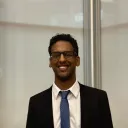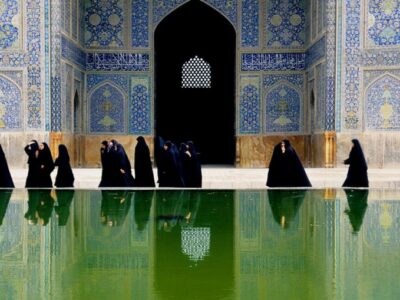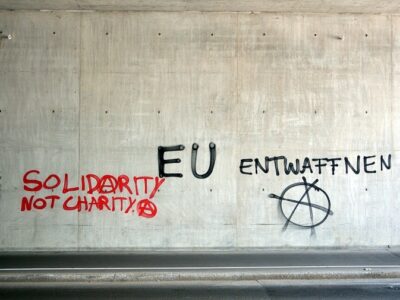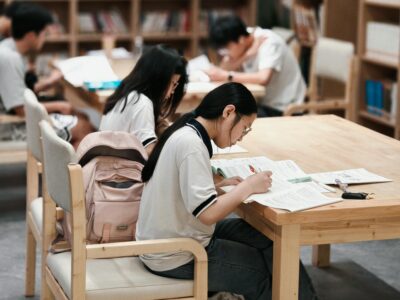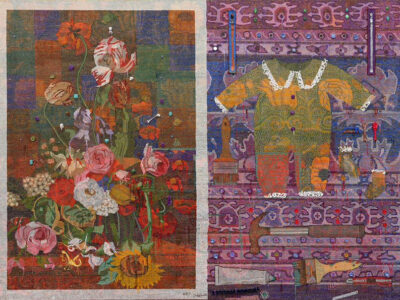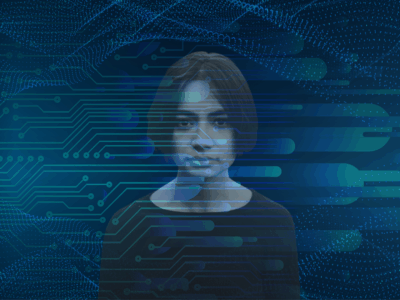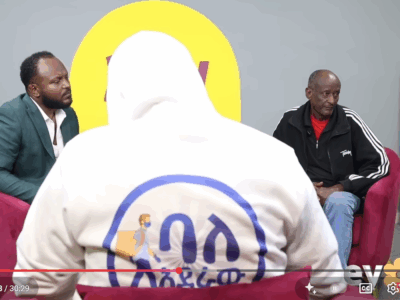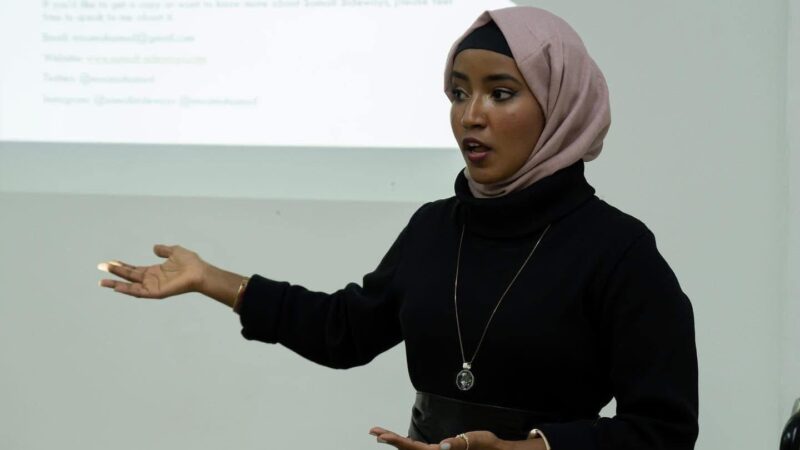
Photo of Salma Osman Abdi by Ibrahim CM. Used with permission.
This interview was supported through the African Union Media Fellowship and the International Consulting Expertise, in partnership with the European Union.
The African Union Media Fellowship (AUMF), implemented by the African Union Information and Communication Directorate and supported by the European Union, aims to change the common narratives about Africa.
The AUMF thus underlines the necessity of elevating African voices in international discourses. It explores how storytelling can help audiences understand how migration affects individuals, families, and society as a whole — not just through numbers and policy issues but deeply human experiences.
The series of interviews produced as a result of this project aims to highlight stories from the diaspora that cover the themes of migration, culture, creative art, community activism and international cooperation. This was more than a professional assignment; it was deep into the lives and stories of Somali diasporans in two cities that are both rich in history and alive with cultural diversity.
Many of those featured through this fellowship are people whose voices seldom get heard-entrepreneurs, community leaders, artists, and students — each in different ways making their way into the challenges and opportunities of migration. Their testimony reflected not just the private tribulations and victories but also much wider themes: Struggles of identity and belonging, where tradition meets modernity.
Salma Osman Abdi is the Executive Director of the SAFWAC Foundation, an NGO dedicated to aiding dispalced communities and refugees in Egypt. She was born and raised in Mogadishu, Somalia, but moved to Cairo, Egypt, in 2006, where she currently resides. She has been a member of the SAFWAC Foundation since its inception in 2011, serving as a co-founder. In late 2022, she was appointed by the board to take on the role of Executive Director.
Mohamed Mohamud (MM): Could you start by telling me about yourself and your background?
Salma Osman (SO): I'm Salma Osman Abdi, a Co-founder and now Executive Director of the SAFWAC Foundation. I am originally from Somalia and currently living in Cairo, Egypt. I co-founded the organization in 2011, and toward the close of 2022, our board appointed me the Executive Director. My commitment to SAFWAC all the years of its existence has been for rather deeper purposes than any other commitment outside self and family.
MM: What motivated the establishment of SAFWAC? Can you tell me more about its mission and community service?
SO: SAFWAC Foundation stands for service and care. The organization was established to ensure a better quality of life for Somali refugees in Egypt, extending its support to other vulnerable groups as well. It became officially registered with the Egyptian Ministry of Social Solidarity in 2022.
Our mission is deeply rooted in empowering those most in need: women, children, youth, and the elderly. We provide necessary services that are specifically designed for these groups. SAFWAC has become a hub for the Somali community in Egypt, and we have expanded our reach to serve other communities, including refugees from Yemen, Palestine, Ethiopia, Sudan, South Sudan, Eritrea, Iraq, and Syria.
MM: What are the main services SAFWAC provides?
SO: We concentrate our work in five priority areas:
Education and Awareness: Organized trainings with the objective of bringing the ability and capability to improve individually for both personal and professional purposes;
Psychosocial and Legal Protection: The displaced persons undergo all manner of stresses, which make life really unbearable, and we therefore try to ameliorate the situation with counselling and legal aid to ease their lives.
Cultural and Literary Services: We encourage and support cultural awareness and literacy-the means of identity preservation and integration within host communities.
Space for Creativity: Creativity is a self-expression capability, therapeutic in nature and empowering. Thus, we provide the creative space for community members to share their talents and bond with others.
Volunteer Preparation: Similarly, SAFWAC equips volunteers to make valuable and meaningful contributions to the community.
These services create an enabling environment for growth and interconnectivity.
MM: Your work mainly deals with Somalis in Egypt. What are the problems they face, and how does SAFWAC try to address them?
SO: The Somali community in Egypt, particularly refugees, faces many challenges: Isolation, limited access to resources, cultural barriers, and the legal and psychosocial difficulties of displacement. SAFWAC works to bridge these gaps by offering structured and accessible services that reduce isolation and provide tools for resilience.
Our programs are holistic, addressing immediate needs like legal support while also promoting long-term empowerment through education, cultural engagement, and creativity.
MM: You’ve also mentioned that SAFWAC supports other refugees, not just Somali. For what reasons would inclusivity feature so much in your mission?
SO: Well, because vulnerability and displacement knows no nationality and groupings. We happen to mostly focus on our Somali community, but indeed we take in people right from across the region. Everyone needs to have that dignity to be themselves; hence the approach of inclusiveness makes way for a united one.
MM: SAFWAC recently expanded operations into Mogadishu. What’s the focus of your work there?
SO: In Mogadishu, our efforts focus on creating community awareness and spreading the culture of reading and literature. We strongly believe that through this, we will have more literate and culturally engaged people who will help build a better and well-informed society. This branch is still in its infancy, but it is a great step for us to be able to support Somalis both in the diaspora and back home.
MM: What impact has SAFWAC had on the communities it serves?
SO: AFWAC has touched thousands of people directly and indirectly in positive ways. Through an organized and inclusive platform, we’ve alleviated isolation and supported many people through tumultuous times. We are indeed earning an exemplary status among the Somali and general refugee communities.
MM: What is your hope for SAFWAC in the future, in relation to its work in the community it serves?
SO: The overall goal is to contribute to the development of a healthy and balanced society in which the most vulnerable population can live a dignified life and enjoy their rights. We want to expand our programs, reach more people, and make sure no one feels forgotten or left behind.
For us, the work is never complete. Each success story gives us an urge to move on further. I really do think the best years of SAFWAC lie ahead, and I look forward to what we can accomplish together.
MM: If someone is interested in supporting your work or finding out more about it, what should they do?
SO: We always welcome collaboration through volunteering, partnerships, or donations. To find out more about our programs and services, I encourage people to go online and visit our site.

